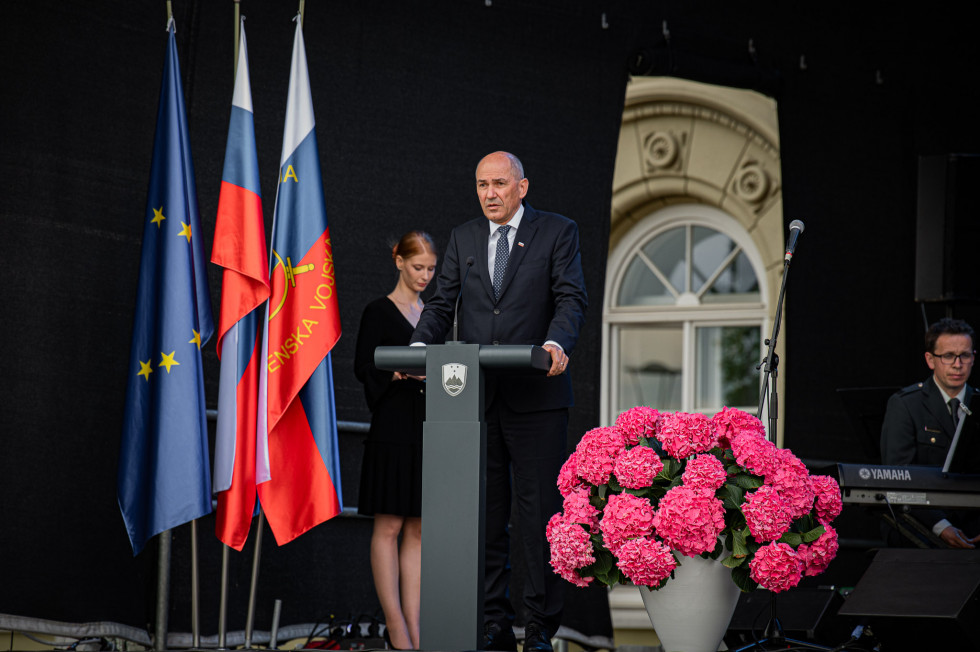Prime Minister Janez Janša: We have gathered today to honour the courage of Maribor and that of the Pekre defenders of 30 years ago with music
- Former Prime Minister Janez Janša (2020 - 2022)
He initially welcomed the guests, especially those who were in Pekre or on the streets of Maribor 30 years ago and who defended Slovenia’s freedom and its right to realise its age-old dream. "I see familiar faces who at the time were either draftees or those who defended with arms the first generation of Slovenian young men serving their country in peacetime for the first time in history," said the Prime Minister. He added that those developments are somewhat immodestly called the Pekre events, but we all know what that meant. "In truth, those were not events, but an introduction into the defence of Slovenia, the start of the war for Slovenia and the first test of actual strength between Slovenia and Belgrade, between the Slovenian Territorial Defence and the Slovenian Police and the Yugoslav People's Army on the other hand, a power struggle between the units being established in order to defend with real force the historic decision of the Slovenian nation made at the plebiscite and the units which wanted to prevent that," explained Prime Minister Janša.
He continued by pointing out that many books and articles have been written about why that happened in Maribor of all places. "The first Slovenian draftees were conscripted in Pekre and Ig, and the Yugoslav People's Army demanded that both centres be dissolved. However, the attack and the attempt to forcefully dissolve the centre occurred only in Maribor. In the decades following the confrontation, it became clear that the Yugoslav People's Army or Belgrade had chosen Maribor based on an incorrect assessment. It was believed that people would support the violent suppression of the Slovenians’ independence aspirations because Maribor was involved in industry linked to military armaments and considered one of the centres of the Yugoslav working class. Instead, Maribor resisted heroically. And today, we will celebrate the courage of Maribor from 30 years ago with song, music and art," stated Prime Minister Janez Janša.
"If, at the time, the people of Maribor did not stop the reinforcements sent to Pekre by the Commander of the 31 Corps, the big question was whether the Yugoslav People's Army would actually use force against the poorly-armed defenders. If the people of Maribor did not flood the streets when the tank engines were fired up in the barracks, the big question was whether the situation could have been handled without major casualties," highlighted the Prime Minister. He emphasised that casualties nevertheless did occur.
"Today we also remember Josef Šimčik, the first Slovenian to die in this conflict or overture to the War for Slovenia. We remember the great courage of poorly armed defenders and draftees in Pekre who listened to the roar of armoured vehicles and tanks all day and night, practically 24 hours, including threatening forecasts and calls to surrender. We also remember those who negotiated at Maribor Town Hall and were then apprehended through deceit," said Prime Minister Janša.
"We must also remember that Maribor was selected, as we later saw in intelligence reports of the Yugoslav People's Army, because they were relying on the Counterintelligence Service of the Yugoslav People's Army having a sufficient number of its followers in the structures of the Slovenian local and state authorities in Maribor who would be able to control the situation. They did not. These followers were fewer than counted on, but they nevertheless enabled the storming of Maribor Town Hall and capture of the provincial commander of the Territorial Defence, which led to the drama that unfolded by Slovenia closing down the facility infrastructure of the Yugoslav People's Army and commencing negotiations," explained the Prime Minister, adding that when the barracks were denied basic logistics, the release of both captured officers of the Territorial Defence was achieved through negotiations.
"At the time, Slovenia tested its firm insistence on its positions: neither of the two centres was closed in spite of several subsequent ultimatums and many appeals from Slovenian politicians that it was useless and that draftees should return home. In part, this concern was justified, especially on the part of the draftees’ parents, who were sending us letters, but we knew what would happen if we succumbed. We persisted at this point. We tested manoeuvres that were somewhere between negotiations and armed conflict, which meant the blockading of barracks and closure of infrastructure, which served as good practice for the coming June and July when the war actually began in earnest," said the Prime Minister. He added that "a lesson was learned, especially with the storming of Maribor Town Hall and hostage-taking, that it is necessary to remain cautious in regard to security measures, which were later significantly strengthened."
"We have gathered today, particularly to honour the courage of Maribor and that of the Pekre defenders with music. Music is a universal language that unites nations around the world. We are particularly pleased that we Slovenians have a rich music tradition," said Prime Minister Janez Janša, and concluded, "Long live music as a universal language of humanity, especially Slovenian music. And long live free and democratic Slovenia!"


